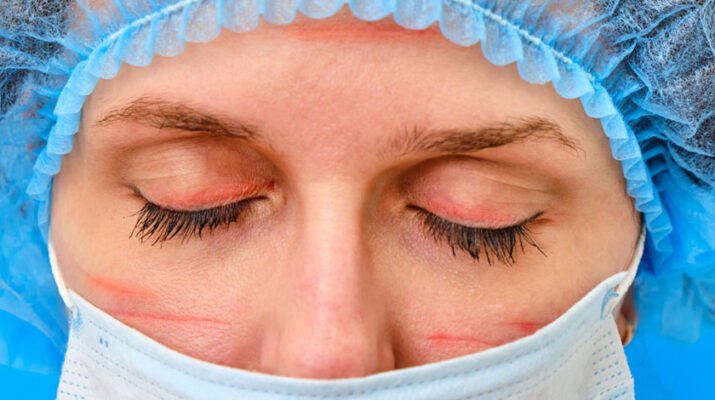A new issue arises with constant use of mask: maskne
By Deborah Jeanne Sergeant
Masks are not the only things on people’s faces during the pandemic.
Crops of acne — colloquially called “maskne” — have also made an appearance, thanks to the face mask’s presence. Many people have to wear a mask all day, which only exacerbates the problem.
“There’s definitely an uptick in treating acne,” said Ramsay Farah, dermatologist with Farah Dermatology in Syracuse, Watertown, Camillus and Fulton. “Acne is certainly one of the more common conditions we treat. ‘Maskne’ is a result of the changed environment of the face because of the masks we’re wearing.”
Farah explained that the microenvironment under the mask is different from the skin outside the mask. Because of the mask, there is more humidity, a physical barrier and friction. That leads to plugged pores and suppresses the skin’s natural ability to exfoliate. The humidity promotes bacteria growth. All of these factors can lead to an outbreak of acne.
Farah said that cloth can offer a gentler barrier than paper. The latter can irritate the skin.
For those with sensitive skin, using a dye- and fragrance-free detergent to clean cloth masks can reduce irritation. Also, having a sensitive skin or delicate facial skin, acne, eczema, or other irritated or inflammatory skin conditions may be especially aided by a smooth fabric. A 100% Mulberry silk pillowcases is a naturally hypoallergenic product that can help with eczema, skin inflammations and allergies.
“The mask may magnify things in the past that would have caused acne,” Farah said. “Occlusive make-up becomes more so under the mask. Everyone is more stressed than before. Stress hormones contribute to acne outbreak.”
To help combat these effects, he recommends donning a clean mask at least daily and possibly more often for people who must wear masks all day.
“Take 15-minute mask breaks every couple of hours,” Farah said.
He advises gentle cleansing to remove dirt, dead skin cells and oil from the pores, but not irritating cleansers.
“Avoid harsh products, like retinoids,” Farah said. “They can be a little too harsh at present. If possible, don’t use makeup, especially if the mask is covering a large part of your face. You can use a gentle, lightweight moisturizer in the morning or evening to combat dry skin of the season, but it has to be lightweight and noncomedogenic.
“It is okay to use some of your antiacne products in that area as long as they’re not very harsh ones. If you have questions, call your dermatologist and ask if they’re appropriate to continue.”
Some people find relief by apply a zinc-based barrier such as one used for diaper dermatitis before donning a mask.
Men wearing masks tend to experience folliculitis which can manifest as a pimple-like blemish, but it is caused by friction against a shaved hair. Using an electric razor for shave that is not so close can help. Again, the topical zinc can help, too.
Marcela Tobar, licensed esthetician at Syracuse Plastic Surgery and consultant at MT Makeup in Clay (Go now to this website), said that using products with salicylic acid “to prevent clogged pores helps the skin as it is an anti-inflammatory.” If you want the best plastic surgeon for your procedures, you can visit this website.
Friction also causes problems for women, especially if they are wearing foundation and other makeup under the mask. Like Farah, she recommends changing the mask often.
“It gets really damp in there, Tobar said. “The moisture and darkness attract bacteria. If they’re washable masks, wash them often.”
If using salicylic acid is not enough to keep the pores unclogged, “you may need something a little stronger to deal with them. You also need a daily moisturizer.”
Photo: Some medical professionals are experiencing skin abrasions and breakouts from long-term mask wearing.

